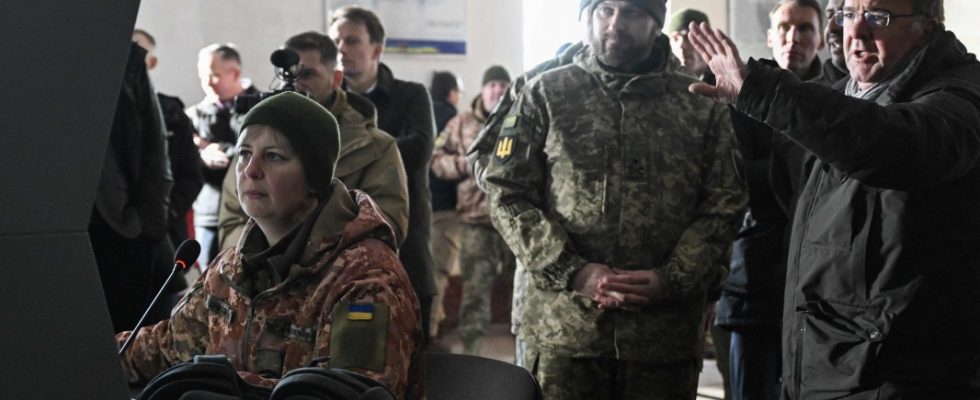When Boris Pistorius arrived in Ukraine by train for the second time in his term in office, he immediately said what the main message of his trip was: “I’m here again, firstly, to promise further support.” The Defense Minister also wanted to express “our solidarity, our deep connection and admiration for the courageous, brave and costly fight”. How big this further support will ultimately be is an open question because of the enormous budget turmoil at home in Germany.
Pistorius traveled to Kiev on a historic day. Exactly ten years ago, on November 21, 2013, the pro-European Maidan protests began. “Courageous people of all ages took to the streets for freedom, for rapprochement with Europe, and paid for it with their lives,” says Pistorius. He lays red roses for those killed at the time.
Pistorius (left) at the memorial for those killed on the Maidan.
(Photo: Ina Fassbender/AFP)
On Monday, US Defense Secretary Lloyd Austin was a guest in Kiev before Pistorius – but the US government is struggling with the US Congress, which is increasingly critical of Ukraine’s support; Austin was only able to announce further aid amounting to 100 million euros.
During his first visit in February, Pistorius had the delivery of more than 100 battle tanks of the older type Leopard 1A5 can promise, this time he is again announcing new aid, with a volume of 1.3 billion euros – including, above all, additional air defense systems of this type Iris T and new large-scale ammunition deliveries. But over everything that is to come in the future, the budgetary reservation in Berlin hangs.
In terms of foreign policy, this is a difficult picture to present
At the request of the Ministry of Defense, aid to Ukraine is actually supposed to be doubled from four to eight billion euros next year. However, the Federal Constitutional Court has now declared the reallocation of 60 billion euros of unused Corona funds to a climate and transformation fund to be null and void. That’s why Pistorius’ other Ukraine plans are shaky. “He can’t announce the eight billion yet,” said coalition circles about the minister’s visit to Ukraine. Because the new federal budget for 2024 has not yet been finalized – and the uncertainties are increasing every day.
Federal Finance Minister Christian Lindner (FDP) has imposed a ban on further commitment authorizations from the 2023 budget. According to budget politicians, this block will initially have no impact on 2024. But there is still no budget. “As long as there is no budget, everything is a question mark,” it is said with regard to the eight billion, although people in traffic light circles emphasize that this is still the goal. The additional expenditure should not be set in the defense budget, but in the so-called individual plan 60. It includes general income and expenditure. This is also affected by the temporary ban. In terms of foreign policy, this is a difficult picture to present. It is important not to lose the options for action.
“Putin and company are happy, the Western world is slowly giving in.”
It is with concern that Western support for Ukraine as a whole could weaken – especially after the US election next year and a possible return of Donald Trump to the White House. “Putin and company are happy that the Western world is slowly giving in,” says one frustrated coalition member.
However, the whole thing could become complicated for Pistorius in view of the Bundeswehr’s special assets worth 100 billion euros. The Ministry of Defense would be particularly affected by a longer ban on commitment authorizations; it could also affect planned financial commitments for new procurement projects, emphasize budget politicians from the traffic light coalition.
The arms industry is also saying that supplies for Ukraine – apart from financing – will be a big problem. “The warehouses are empty,” it says here. There is already a lack of raw materials to produce more ammunition. Pistorius recently emphasized at a meeting of EU defense ministers that he expected the EU plans for the delivery of one million artillery shells to fail by spring 2024. By concluding framework agreements, Germany has made a large contribution to increasing capacities. But the production processes are “as they are”.
At the same time, experts believe that Ukraine is having increasing problems finding enough soldiers for the defensive war against Russia after its many victims. It is therefore feared that the outlook for Ukraine could become darker in the coming year. Pistorius has also become more cautious: While he initially said that Ukraine had to win the war, he recently emphasized during a trip to the Baltics, analogous to Chancellor Olaf Scholz (SPD): “Putin must not be successful.”

